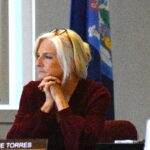A major University of Maine system food service provider is partnering with Circle B Farms of Caribou to bring more locally-grown food to four UMaine campuses.
Sodexo, the French food service giant that holds a $12 million per year contract with the UMaine system, has hired Circle B Farms as its northern Maine food aggregator, as part of an effort to source 20 percent of all UMaine food locally by 2020.
Under the arrangement, Circle B Farms will collect and distribute locally-sourced produce from around northern Maine to serve the campuses at Fort Kent, Presque Isle, Machias and Orono.
“It means a lot to a small farm in northern Maine,” said Circle B owner Sam Blackstone at the UMaine board of trustees May 21 meeting at UMPI.
Circle B grows apples, blueberries and a variety of vegetables, and has been selling to colleges and universities for a while. The farm also recently started marketing dried blueberries and apples.
With two year-round full-time employees, two delivery trucks and expanded cold storage space, Circle B will be working with more than a dozen area producers to help Sodexo buy local produce.
The role of food aggregator was created earlier this spring as a way to address a number of challenges Sodexo faced in sourcing local food, including a requirement for $9 million in liability insurance. Premiums for that kind of insurance would be too costly for small farmers, while Circle B can meet the requirement with its year-round sales, said John Rebar, executive director of the University of Maine Cooperative Extension.
In 2015, the UMaine system adopted a goal of locally-sourcing 20 percent of food served at the seven campuses by 2020, which was included in Sodexo’s 2016 contract, which covers all but the Orono campus.
According to a presentation at the board of trustees meeting, the campuses are so far sourcing 17 percent of food from 100 local farmers and food producers.
“Increasing understanding and opportunity in our state’s natural resource-based industries is a priority for Maine’s public universities,” said Sam Collins, chair of the board of trustees. “Being a better customer for our local growers and processors complements the traditional research and programming support our institutions have been providing to generations of farmers, fishermen, and foresters.”







